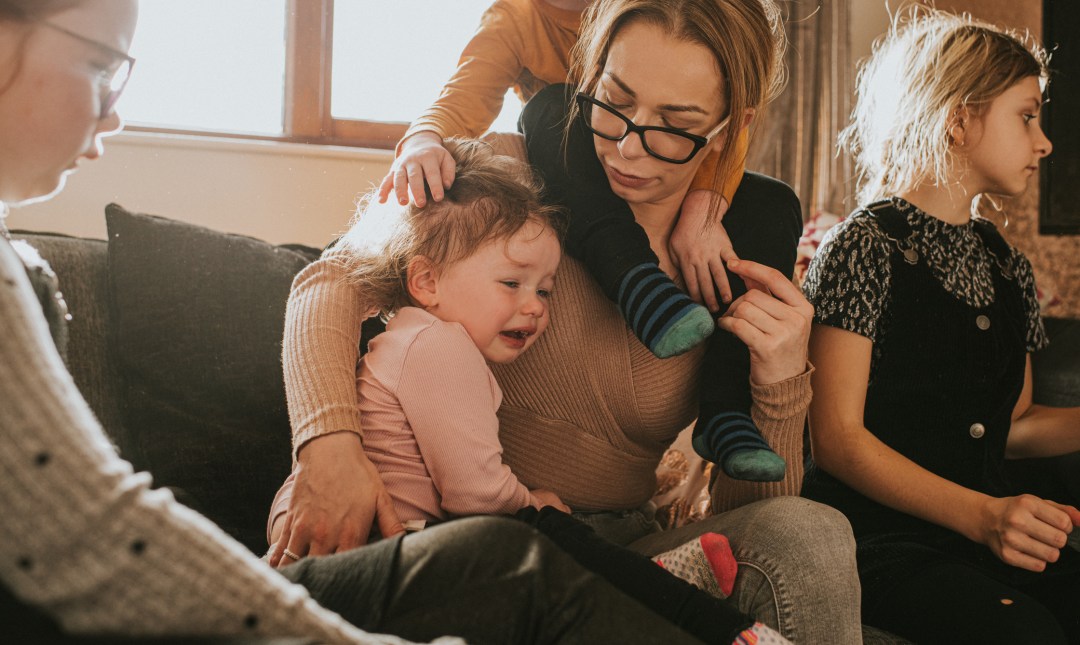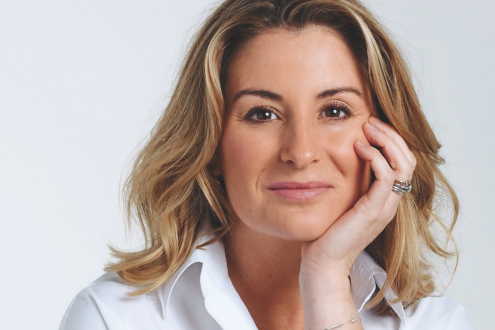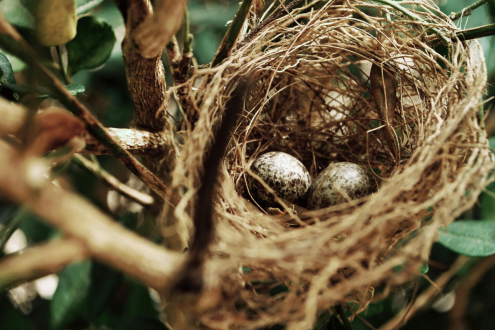6 Myths of Modern Motherhood & How to Bust Them For Good
Danusia Malina-Derben, mother of ten and author of 'Noise: A Manifesto Modernising Motherhood', writes about how to leave the fantasy of being a good mother behind

Countless myths surround mothers and motherhood, and these myths impact the ways we experience motherhood as well as how we observe, judge, and treat mothers. Intense focus on an ideal of ‘Good Mother’ is probably the most enduring myth, embedded across cultural and socio-economic locations. This myth forms a significant part of our collective “fantasy baggage” and is not a model mothers can truthfully aim to replicate in real life.
In my latest book, NOISE: A Manifesto Modernising Motherhood, I dismantle six systemic narratives shaping mothers’ lives and our views of motherhood. These narratives have become mythological ‘truths’ which I bust. In doing so, I propose a rebuild and new conversations for mothers that positions them as the powerful social change agents our world desperately needs.
Here are those six myths and how to bust them.
Myth One: Motherhood is Our Calling
Being a mother is persistently positioned as the culmination of women’s existence, pitched as the ultimate goal for any ‘good’ woman while simultaneously being the least recognised job in the world. This same myth tells us we can be a mother, have a career, have it all, but our children must come first.
Bust it: All women are held accountable to this myth, but when considered under an alternative lens of race, education, and class, nuanced complexity becomes obvious. Research shows white working-class mothers often view motherhood a calling since other options may not be present. White middle-class mothers of financial means may also perceive motherhood as a calling since their financial resources may allow this. Questioning whether our structural circumstances offer the opportunity to place being a mother as pinnacle is vital. When we strip back Western, white, upper-middle-class narratives that blanket this myth, it falls apart.
Myth Two: Mothers Must Make Our Children Happy
Knowing what makes our children happy is an ever-changing smorgasbord. The responsibility for shaping our children into functional, contributing, stable and happy people is single-handedly given to mothers. This task of making and buoying up children’s happiness is cited as a source of deep worry for many mothers. Yet it’s key to remember there’s a considerable difference between putting in place the best conditions we can for our children to be happy and taking responsibility for their happiness in ways we ultimately can’t control.
Bust It: It’s better to teach our children to have developed understandings of their mental health rather than educate them that their mother is in charge of their happiness. This false reality doesn’t help them learn emotional regulation or navigate the world with the inner skills they require themselves. Being happiness gatekeepers is not in our children’s best interests or our own, but being their guides helping them explore what happiness means for them individually helps equip them to chart their own happiness journeys.
Myth Three: Mothers Must Be Selfless
Once we’re mothers, we’re no longer seen as a person in our own right. We’re told repeatedly from every corner of society that everything – our hopes, desires, dreams – must be relegated or stop once we become mothers. Even the notion of self-care is entwined with mothers being selfless. Self-care is ‘allowed’ as long as it keeps us focused on our ability to mother. Being selfless asks us to be less of our selves.
Bust It: This myth tells us that when we choose to become mothers, we abandon the ‘selfishness’ of focus on ourselves because that’s what ‘good’ mothers do. Truth is, we have to pursue the things we need for ourselves as whole human beings. If not, we leave our children with a terrible burden, that we failed to live our lives because we gave it all up for them. And perhaps worse, we leave our daughters with the legacy they should do the same.
Myth Four: Mothers Must Feel Guilty
Guilt and motherhood are wrapped up in social narratives about ‘Good’ and ‘Bad’ mothers. Good mothers sacrifice ourselves for our children; we don’t need time for ourselves or ways to feel fulfilled outside of being a mother. Anyone who strays from or even thinks outside these narratives inevitably feels guilty for not staying the true path of ‘good’ motherhood.
Bust It: There are tips everywhere on coping with maternal guilt, but the assumption this guilt exists as an accepted part of motherhood continues to go uncontested – and that’s how we bust it. Trouble guilt in your life, pull the threads of its existence apart and see where they lead. Many mothers find our guilt is wrapped up in narratives that simply don’t belong to us.
Myth Five: Mothers Ambition Shrinks
Being a central figure in our own lives is unacceptable for ‘Good’ mothers. Where ambition is allowed, it must be tethered to productive pursuits within a career or creative activities that aid homemaking or benefit partners and children. The idea that mothers might have ambitions and seek to grow as individuals in our own right is still considered somewhat redundant and self-absorbed.
Bust It: It’s inaccurate to suggest that ambition shrinks for mothers; the link between reducing ambition and motherhood isn’t proven. Women’s ambition levels vary, but this is unrelated to motherhood and links to (unsupportive) company cultures, expensive childcare and insufficient support. Ambition isn’t a fixed attribute but is nurtured (or damaged) by daily interactions, conversations, and opportunities women face within organisational, cultural and social structures.
Myth Six: Mothers Must Be Sexy and Sexless
‘Mothers, sex and sexuality’ are not words put together frequently. Writer Adrienne Rich suggests that a mother’s experiences of sexuality are not only personal but institutional; heavily regulated by a patriarchal society. Integrating our sexual and maternal self causes conflict for many women. The bottom line is mothers aren’t supposed to be sexual, at least, some mothers aren’t, while others are expected to occupy a ‘sexy mother’ identity.
Bust It: Whether denied sexuality or over-sexualised, mothers are constrained by seemingly ‘appropriate’ sexual behaviour. Classic madonna-whore mythological noise is at the source of contradictory judgements and expectations of different mothers. Viewing this myth through opposing social and cultural structures around motherhood promptly sees it fall flat. Busting this myth in a hypersexualised and sexist society is a must to reclaim our right to, as Audre Lorde says, “an assertion of our life force”.
One Bonus Myth: It Isn’t All About Mothers
When mothers rearchitect our relationship to these six myths, it potentially affects men’s relationship with themselves as fathers. After all, many mothers don’t live in a silo bubble separate from the other key figure in our children’s lives: their fathers. It’s fair to say, though, that mothers are still expected to carry the responsibility for children and everything domestic despite much societal progress. So, in reshaping conversations around motherhood, the place of fathers within that conversation can transform.
I’m especially interested in that transformation, as I know many parents will be, and it forms the basis of my next book, SPUNK: A Manifesto Modernising Fatherhood. When we actively begin to engage in the myths surrounding motherhood and parenthood more generally, we instantly create space for bold, new dynamics and ways of thinking. It’s a conversation that’s only just beginning.
NOISE is available for purchase from Amazon and online book retailers
Pre-orders for SPUNK are open now for forthcoming publication in November 2021.
About Danusia
Danusia Malina-Derben is a mother of ten children and still her own woman. From teen mother to tenured Organisational Behavior and Development academic, and onto award-winning, internationally published leadership expert. Danusia traded academia to head a global firm that fixes corporate boardrooms and develops top talent.
She also hosts two critically acclaimed companion podcasts; School for Mothers and School for Fathers. Danusia has received praise and recognition from The Sunday Times to Metro, Psychologies to Good Housekeeping. She lives in the South Downs, UK, with her family and their mini-dachshund, Dickie. Visit her online at danusiamalinaderben.com
Image: Getty Images









